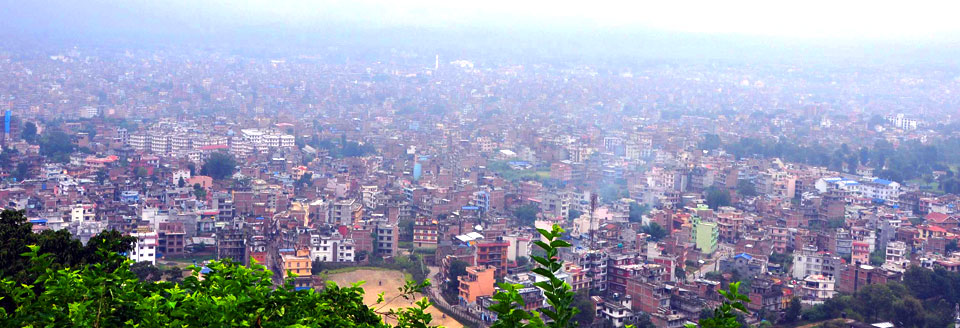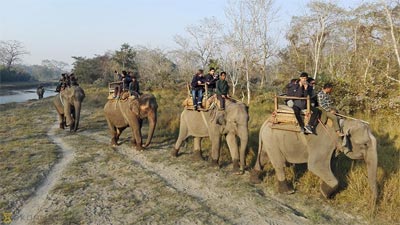

Ban on elephant safari will kill business, say operators

Jungle safari operators in Chitwan and Nawalparasi say that they will go out of business if the government gives in to demands from animal rights activists to ban elephant-back tours.
Pressure has been mounting after eco-tourism pioneer Tiger Tops removed the item from the itinerary from last July in a bid to end animal suffering.
Tiger Tops has launched different kinds of activities to replace elephant-back tours in the jungle to observe wildlife in their natural habitat. Adventure seekers will now follow the jumbos on foot to observe their activities instead of riding on their backs to sightsee in the jungle.
Tiger Tops has also stopped, after 35 years, Nepal’s most popular but unusual sport known as elephant polo, which is played every winter on a grass field in Meghauli, Chitwan.
Leading travel company Thomas Cook has come under fire for its outsourcing of rides and services to companies in Zimbabwe, Thailand and India. In the wake of these allegations, more than 60 companies around the world including UI Nederland, Intrepid Travel, Apollo, Albatross Travel and World Expeditions announced they would forever cease operations selling elephant rides and shows.
Since 2014, more than 100 high-profile operators have stopped selling excursions featuring elephant rides and TripAdvisor stopped promoting them in 2016, according to reports.
Some elephant safari operators have called the move to ban elephant rides ‘misguided’. “We are not committing any offence. We have not abused the jumbos, nor have we used them in circus and entertainment or forced them to carry tonnes of loads,” said Basanta Raj Mishra, executive chairman of the Temple Tiger Group.
“Obviously, the elephants earn money for us but we cannot just wake up and agree to ban elephant-back safaris.” The ban will not provide alternatives for elephants and their owners, he said.
The captive elephants need to eat 150-250 kg of food per day. Owners have to spend Rs50,000-60,000 per month to house, feed and provide medical treatment to them. “Without tourism, these elephants will have nowhere to go, and no one to pay for their fodder.”
Besides, entrepreneurs have spent billions to build hotels and resorts in Chitwan and Nawalparasi, and their sole objective is wildlife adventure, the jumbo safaris. There are an estimated 200 captive elephants in Nepal, including those used by the government for jungle patrols. An adult elephant costs up to Rs8 million.
There are different kinds of tourists, some who enjoy walking with elephants and feeding them and some who enjoy riding them.
“On the other hand, the concerns of animal rights activists over elephant suffering cannot be dismissed,” he said. “But we need to strike a fine balance. How can we
do that?”
Mishra said, “For years, elephants used to carry up to six people through the jungle for 2-3 hours daily. Currently, many progressive elephant camps are providing tours with an elephant carrying one or two persons. A guideline can be introduced in Nepal to reduce the number of people and the hours elephants work per day.”
Likewise, as inexperienced mahouts are mostly seen punishing elephants and making them afraid, such behavior could be monitored to create a comfortable and intimate interaction between elephant and rider, said Mishra.
Suman Ghimire, president of Hotel Association Nepal, Chitwan Chapter, said Nepal has made strides in the care and monitoring of elephants. “The operators don’t keep them in terrible conditions. The jumbos are nowadays under veterinary care and are provided adequate nutrition. So, we have not abused the animals. Only a few casualties have been reported among captive elephants in Nepal,” he said.
The number of elephant camps in Chitwan and Nawalparasi has grown significantly in recent years to meet the rapidly growing demand of foreigners and Nepali thrill seekers.
“In such a scenario, Nepal cannot afford a complete ban on elephant-back safaris,” said Ghimire. “However, considering the pressure from the international community and animal rights activists, there is an urgent need for reform and regulation in the elephant tourism industry. Nepal should introduce and enforce a guideline that ensures safety of the animals and promotes Nepal’s wildlife tourism. This way, we can positively impact the captive elephant situation.”
source: the kathmandu post,16 jan 2018








